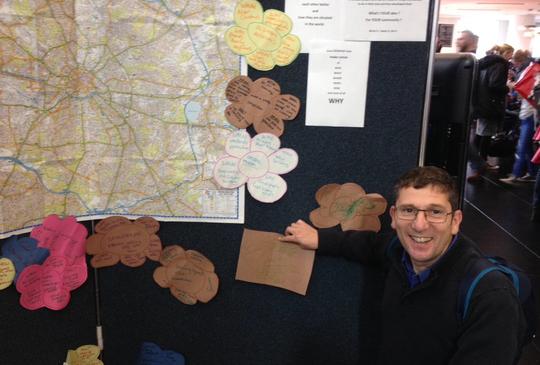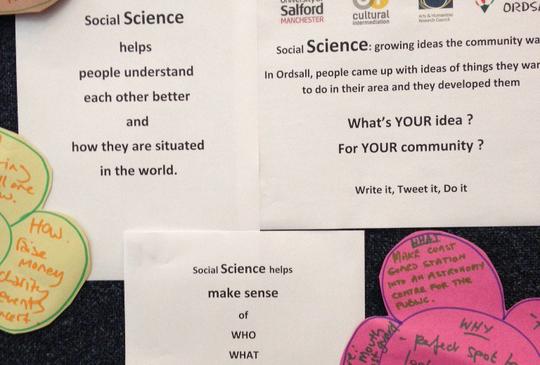
The Manchester (Social) Science Festival
‘Social Science should be represented at the Manchester Science Festival’ was the battle cry and an idea was hatched to take a stall at this year’s festival at the University of Salford’s Mediacity campus.
Our pitch was that social science helps make the connections between different disciplines and develops replicable methods in the process.
Like physicists or engineers, we work with hypotheses and we seek insight by working with the natural world.
Our subject matter focuses on humans and their interaction with each other and non-human entities and our processes of data collection, analysis and insight are similar.
The challenge for this festival was to make ourselves as interesting as the flood simulator that comprised a sand and water fountain or the particle accelerator demonstrator that had plastic guns and drones buzzing about.
Our aim was to demonstrate the value of social science and also to help visiting science buffs see the connection between our project and their own interests.

The project on display was Ideas4Ordsall, an 18 month aspect of a four year project looking at Cultural Intermediation, funded by the Arts and Humanities Research Council (AHRC).
As an anthropologist, I’ve been fortunate to spend time in a Salford community researching cultural activities and working with local arts organisations, artists and people from the community who had ideas that they wanted to develop further.
Also present at the festival was Rosemary Swift, one of our ‘Ideas people’ who had co-written a history play and co-produced an animation of Ordsall history.
Laura Ager, a PhD student whose research focuses on how universities contribute to festivals also provided insight and enthusiast participation in the day’s activities.
Together we set up our stall, which showed the Ideas4Ordsall project to full effect.
We displayed 20 ideas from the local people of Ordsall and some of the fruits of their labour.
Along with the social history play written by Rosemary, the project has supported the development of an artist collective, a community festival, craft/photo/cooking workshops, research into a WW1 war nurse, a mobile mining museum, a community billboard, several films and much more.
Feedback from a typical visitor to the Science Festival (my 12 year old son) told us that we needed to make our stall interactive.
So we put up a large map of Greater Manchester and when we showed people the map of ideas that people had developed for their community in Ordsall, we asked visitors what they would do in their community.
What a fabulous result. Over the day, we had about 50 people fill in an ‘Idea Flower’, which structured their ideas into a What/Why/Who/Where/When/Why matrix.

This helped them see how they could practically realise their ideas. Most people realised very quickly what they would like to do and we got the impression that we had motivated some to take those important first steps to make their ideas happen.
We took photos of each person with their ‘idea flower’ in front of the Greater Manchester map and then tweeted it with the hashtag #growyouridea so they could refer back to the idea whenever they wanted to.
My favourite idea was Zeke’s from Bolton. He wanted to establish a science disco club where people could discuss science and dance as well - sounds amazing!
Social science provides a structured method for engaging people in social issues of the day.
It helps people think about how to address complex challenges through collecting data, analysing issues from different perspectives and producing insights and recommendations for action.
Social science helps us think about how to act and how to learn from that action.
The discipline is critical and complimentary to scientific discovery because it encourages reflection on the implications of our activities, something often overlooked in the thrill of the new.
To learn more about Ideas For Ordsall, visit their website and keep up to date on Twitter.
Image from Flickr user Mars P.
Q&A: Jessica Symons, Research Fellow at the University of Salford
Contributed by Grace Fleming
Contributor Profile
Jessica Symons is a consultant on green and digital development. Her expertise lies in service/product strategy –turning ideas into practical, realisable projects. Most recently, she led the development of the Green Digital Charter toolkit, the interactive map of low carbon projects in Greater Manchester and EU proposals around open data and educational games. Previously, she was active in making Chorlton green and fair trade, co-founded the thinkingwomen network (@thinkingwomenu



